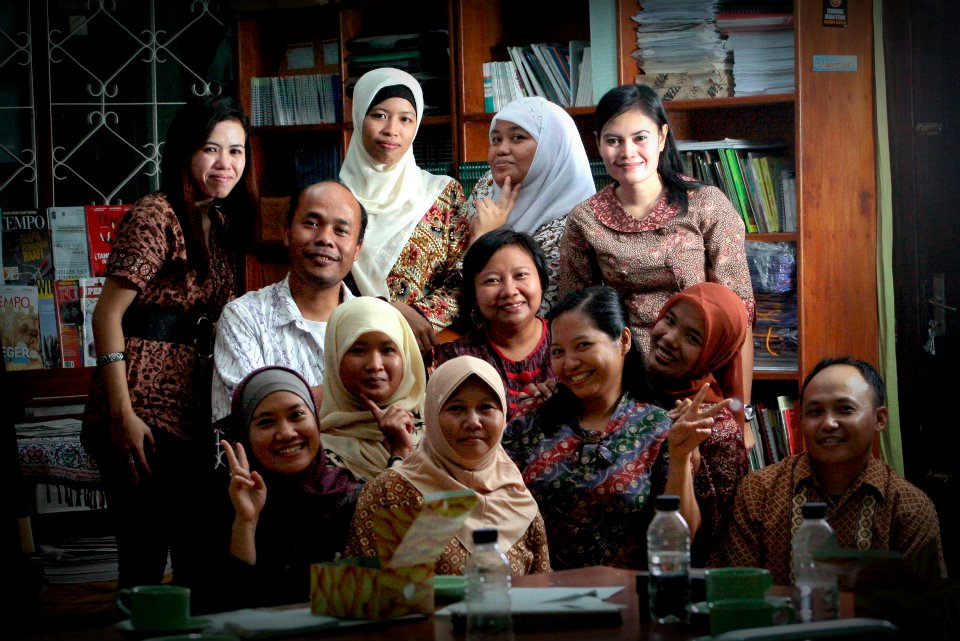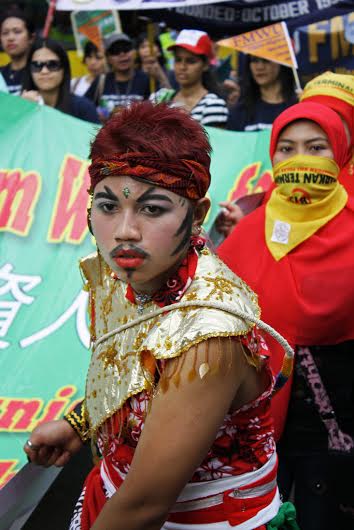Former migrant workers are finding new empowerment in the bureaucratic jungle of legal aid
Benny Hari Juliawan
Like many rural teenagers, Bariyah, the daughter of peasant parents, did not have many options when she finished secondary school in Kebumen District, Central Java. Her vocational training in accounting was out of place in an area in need of agricultural skills. When her teacher offered to help her (and the rest of her year group) find work in Malaysia, it felt like a godsend. It turned out that this teacher was a broker, who was able to place her in an electronics factory in Kuala Lumpur. Bariyah was made to sign a contract, but did so without adequate knowledge of its terms. Unknowingly, she had placed herself US$800 in debt to the recruitment agency. Sixteen months later, the electronics business went under. She was sent home without compensation and still in debt. She was also owed six months’ wages. The agency that guaranteed her contract refused to take any responsibility for her situation. Disappointed but refusing to cave in, Bariyah contacted Migrant Care, a non-government organization (NGO) for migrant workers, to ask for help. Two years later, she is a legal officer in the Migrant Care office in Jakarta and studying law at Bung Karno University.
This is an increasingly familiar story. A one-time victim who subsequently becomes an activist in the sphere of migrant worker protection. There are many similar examples: the head of ATKI (Association of Indonesian Migrant Workers) in Jakarta was a domestic worker in Hong Kong for 11 years; PBM (Care for Migrant Workers) is led by a woman who was trafficked to Taiwan; a month in Saudi prison was enough to turn Eko Yulianto, a native of Purwokerto who worked as a driver, into a committed defender of migrant workers’ rights with the organisation BMIAS (Indonesian Migrant Workers in Saudi Arabia). The list could go on. Faced with predicaments that could easily have caused them to fall to pieces, these migrants have instead been motivated to fight for justice – not just for themselves but also for other migrant workers. ‘I was just angry that people like me were treated badly simply because we were not educated and came from the countryside,’ explains Bariyah. ‘I am now studying law as a kind of personal revenge and to help people in similar situations.’
Becoming an activist
Many rural Indonesians struggle to find jobs in the increasingly uncompetitive agricultural economy. Such circumstances make the promise of a relatively high paying overseas job look attractive. Workers who had never ventured beyond the physical and social boundaries of their extended families thus find themselves in the hustle and bustle of an Asian or Middle Eastern metropolis, albeit often locked within the confines of their employer’s house.
Those who are lucky enough to land a job in a relatively forgiving environment, such as Hong Kong, are exposed to a vibrant civil society well-versed in the language of international law and human rights. Very quickly they find their way into the various organisations and movements set up by churches and other civil society groups to support a migrant worker population of over 300,000. On their days off they join street marches and protests to defend the rights of migrant workers. Their voices are amplified by the support of local and international NGOs that are present in the city. A number of migrant workers’ unions were in fact founded in Hong Kong and only later established branch offices in the workers’ home countries. Upon their return, many such workers are keen to continue the struggle.
There can also be more personal reasons for getting involved in activism upon return from working abroad. Migrant workers pick up the lifestyles of ordinary Hong Kong, Taiwanese or Singaporean citizens they live with. This is typically on show on Sundays in public squares, when they congregate to spend their days off together. More importantly, they appropriate the skills, values and worldviews of their host societies. These are not always in harmony with the more traditional values of their home towns and villages. Indeed, many of them struggle with acceptance and self-expression on return. As it turns out, back home their empowered self does not always get the recognition it once received overseas. Only a few opportunities, such as being an activist, give them the scope to build on and develop their new identities.
Filling a gap in the system
Armed with experience and knowledge, former migrant workers provide a critical service in the bureaucratic jungle that surrounds any attempt to improve protection for migrant workers. A returned migrant worker seeking redress for her misfortune faces the daunting prospect of having to negotiate with both the agency that placed her in overseas employment and a variety of government bodies. Under Law No. 39/2009 on the protection and placement of migrant workers, the first step in a dispute is for workers to negotiate directly with their recruitment agencies. Paperwork, unfamiliar legal jargon and unfriendly officials all add to the sense of intimidation that the worker experiences when walking into a recruitment agency office, which will typically be located in a secure private complex. Moreover, since most agencies are located in and around Jakarta, negotiation requires returnees to undertake a long and expensive journey from their homes, which are often in rural areas of Java or the outer islands. In short, inherent power imbalances permeate almost every aspect of the negotiation process. The presence of an experienced ‘case-handler’ is thus a tremendous help. The case-handler assists with gathering documents and evidence as well as representing the worker in making claims against recruitment agencies, insurance companies or government bodies.

Bariyah with the Migrant Care crew in 2012; Indah Josephine
And there is a lot of work to do. In 2012, the BNP2TKI (National Agency for Placement and Protection of Indonesian Migrant Workers) received 9764 complaints from migrant workers and their families, mostly to do with non-payment of wages. However, this is just the tip of the iceberg. Migrant Care has identified 398,270 cases in which Indonesian migrant workers suffered violations of their rights during 2013 alone. Despite this high number, however, migrant workers have no access to state-funded legal aid, which is only available to criminal defendants.
Limited legal aid services are available to migrant workers through the private sector, and through university law schools, some of which offer legal advice as a public outreach service. The majority of cases, however, are handled by non-legal civil society organisations, usually staffed by former migrant workers. Over time, these case-handlers have built up a network of personal relations with relevant government officials and staffers at insurance companies and recruitment agencies. This way, they work more efficiently in obtaining some kind of compensation for their clients. Lily Kusnadi, a former migrant worker in Taiwan and the chairwoman of PBM, has forged personal relations with officials in the Department of Labour and Transmigration and the BNP2TKI. Thanks to these carefully cultivated relations, she is able to secure payments for her clients, sometimes even from the personal pockets of the officials. Ties with the political elite can also provide other corollary benefits. On one occasion, the wife of the Minister of Labour and Transmigration came to open PBM’s new shelter for abused migrant workers. The shelter had been supported by donations from, amongst others, the minister’s wife and the owner of a recruitment agency in Surabaya, East Java. Meeting Lily today, it can be hard to remember that she is someone whose marginal position in the Indonesian political economy once drove her to Taiwan.
A case of empowerment?
Despite their effectiveness, the important role played by these case-handlers reveals a glaring gap in Indonesia’s justice system. Law No. 16/2011 may change this. It emphasises the right to access justice and promises state funding for legal aid services. However, until the relevant bureaucratic hurdles are crossed and the new law can be fully implemented, case-handlers such as Bariyah will continue to provide vital services.
 Lily Kusnadi celebrates the opening of the PBM shelter for abused migrant workers - Benny JuliawanOne wonders also what the future will hold for these case-handlers. Their empowerment has intriguing parallels with developments seen in the world of industrial trade unions and the human rights movement, where members’ fights for justice has propelled them up the political ladder into prominent positions within political parties or patronage networks, a phenomenon so common in Indonesian democracy. One thing is clear: migrant workers such as Bariyah may once have been down but they are surely not out and seem destined to play an important role in Indonesia’s vibrant civil society for the foreseeable future.
Lily Kusnadi celebrates the opening of the PBM shelter for abused migrant workers - Benny JuliawanOne wonders also what the future will hold for these case-handlers. Their empowerment has intriguing parallels with developments seen in the world of industrial trade unions and the human rights movement, where members’ fights for justice has propelled them up the political ladder into prominent positions within political parties or patronage networks, a phenomenon so common in Indonesian democracy. One thing is clear: migrant workers such as Bariyah may once have been down but they are surely not out and seem destined to play an important role in Indonesia’s vibrant civil society for the foreseeable future.
Benny Hari Juliawan (orwellsj@gmail.com) is a researcher in Sahabat Insan, a NGO working on migrant worker issues based in Jakarta
Other related articles from the II archive:
'Wasted Talent'. Ellen Prusinski, Edition 116: Apr-June 2014
'Diaspora Power'. David Reeve, Edition 115: Jan-Mar 2014
Inside Indonesia 118: Oct-Dec 2014 {jcomments on}












